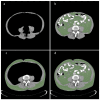Sarcopenic Obesity Is a Risk Factor for Worse Oncological Long-Term Outcome in Locally Advanced Rectal Cancer Patients: A Retrospective Single-Center Cohort Study
- PMID: 37299595
- PMCID: PMC10255819
- DOI: 10.3390/nu15112632
Sarcopenic Obesity Is a Risk Factor for Worse Oncological Long-Term Outcome in Locally Advanced Rectal Cancer Patients: A Retrospective Single-Center Cohort Study
Abstract
Background: Malnutrition and skeletal muscle waste (sarcopenia) are known as predictive factors for a poor postoperative outcome. Paradoxically, obesity seems to be associated with a survival advantage in wasting diseases such as cancer. Thus, the interpretation of body composition indices and their impact on rectal cancer therapy has become more and more complex. The aim of this study was to evaluate body composition indices in locally advanced rectal cancer patients prior to therapy and their impact on short- and long-term outcomes.
Methods: Between 2008 and 2018, 96 patients were included in this study. Pre-therapeutic CT scans were used to evaluate visceral and subcutaneous fat mass, as well as muscle mass. Body composition indices were compared to body mass index, morbidity, anastomotic leakage rate, local recurrency rate, and oncological long-term outcomes.
Results: Increased visceral fat (p < 0.01), subcutaneous fat (p < 0.01), and total fat mass (p = 0.001) were associated with overweight. Skeletal muscle waste (sarcopenia) (p = 0.045), age (p = 0.004), comorbidities (p < 0.01), and sarcopenic obesity (p = 0.02) were significantly associated with increased overall morbidity. The anastomotic leakage rate was significantly influenced when comorbidities were present (p = 0.006). Patients with sarcopenic obesity showed significantly worse disease-free (p = 0.04) and overall survival (p = 0.0019). The local recurrency rate was not influenced by body composition indices.
Conclusion: Muscle waste, older age, and comorbidities were demonstrated as strong risk factors for increased overall morbidity. Sarcopenic obesity was associated with worse DFS and OS. This study underlines the role of nutrition and appropriate physical activity prior to therapy.
Keywords: body composition; locally advanced rectal cancer; morbidity; oncological long-term outcome; sarcopenia; sarcopenic obesity.
Conflict of interest statement
The authors declare no conflict of interest.
Figures
References
-
- Bocca G., Mastoridis S., Yeung T., James D.R.C., Cunningham C. Visceral-to-subcutaneous fat ratio exhibits strongest association with early post-operative outcomes in patients undergoing surgery for advanced rectal cancer. Int. J. Colorectal Dis. 2022;37:1893–1900. doi: 10.1007/s00384-022-04221-8. - DOI - PMC - PubMed
-
- Hossain M.S., Karuniawati H., Jairoun A.A., Urbi Z., Ooi D.J., John A., Lim Y.C., Kibria K.M.K., Mohiuddin A.K.M., Ming L.C., et al. Colorectal Cancer: A Review of Carcinogenesis, Global Epidemiology, Current Challenges, Risk Factors, Preventive and Treatment Strategies. Cancers. 2022;14:1732. doi: 10.3390/cancers14071732. - DOI - PMC - PubMed
-
- Tschann P., Weigl M.P., Szeverinski P., Lechner D., Brock T., Rauch S., Rossner J., Eiter H., Girotti P.N.C., Jäger T., et al. Are risk factors for anastomotic leakage influencing long-term oncological outcomes after low anterior resection of locally advanced rectal cancer with neoadjuvant therapy? A single-centre cohort study. Langenbecks. Arch. Surg. 2022;407:2945–2957. doi: 10.1007/s00423-022-02609-2. - DOI - PubMed
MeSH terms
LinkOut - more resources
Full Text Sources



